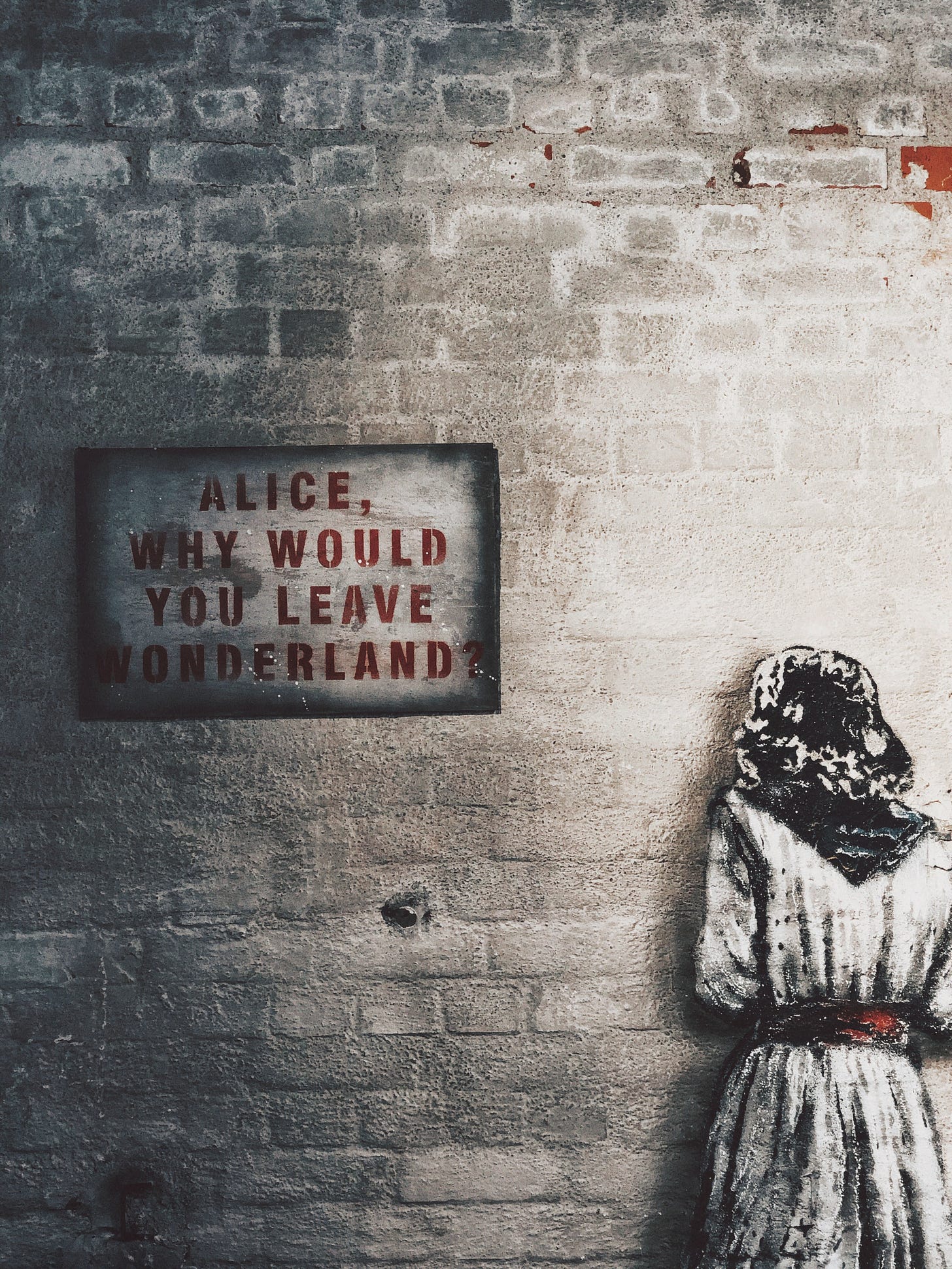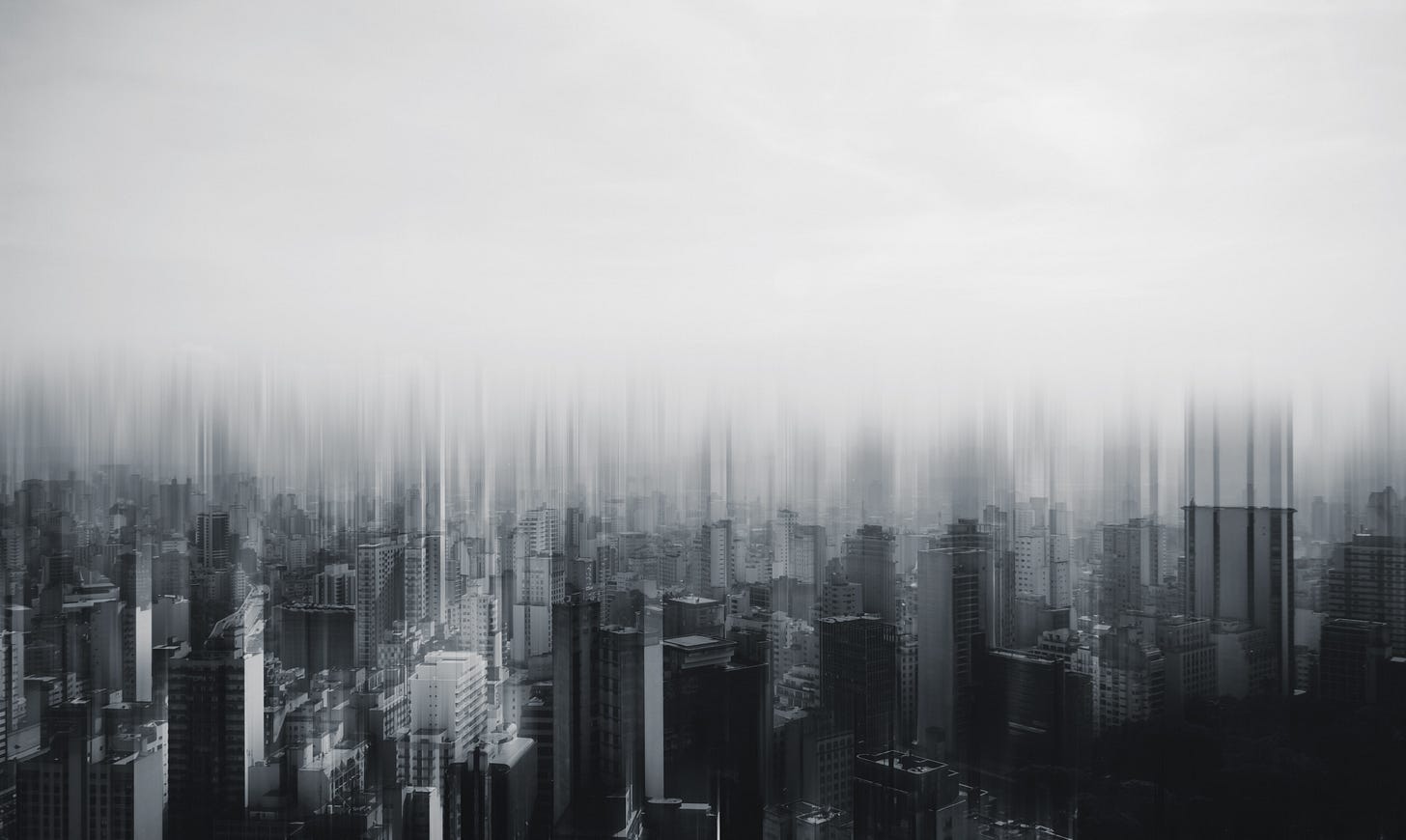Saturday Post 1 (Part1): Why are we really "languishing"?
How long has our world been a false one?
[Note: the Saturday Post - yes, the very first one - is going to have to be in parts. For the first time since Christmas I’ve been able to get out of the house and go spend some time with friends for a weekend. This means I’m going to be writing this in little corners and pockets of stolen time. I’ll try to keep it coherent. HJMW]
Languishing for purpose, connection, meaning
As so often happens, my old blogging buddy Steve Skojec and I are thinking along similar lines. He wrote on his Substack yesterday about the latest, hottest buzzword among psychologists thinking about the effects of Covid lockdowns: “languishing”. Steve and I talk a lot and throw ideas back and forth, and have discovered we’re having the same experience lately, that he describes as “a feeling of general purposelessness”.
I’ve called it a feeling of paralysis; as though I can’t generate enough of a sense of purpose to make myself do anything; often even ordinary daily tasks seem sometimes so pointless as to be impossible even to contemplate. There are things I want to do, but I feel almost unable to move, so overwhelmed am I by a feeling of meaninglessness; sometimes when approaching a task it’s as though every drop of will drains instantly.
I’ve probably struggled with this sense to some degree or other most of my life, but in the last year my feeling of paralytic pointlessness has become almost crippling. It’s not that I don’t want to do anything - far from it - it’s that it just doesn’t seem like anything I want to do is worth doing.
Steve quotes a New York Times piece by a psychologist named Adam Grant, who described our trouble as “a sense of stagnation and emptiness”.
“It feels as if you’re muddling through your days, looking at your life through a foggy windshield. And it might be the dominant emotion of 2021.”
Hands up if this sounds familiar:
In psychology, we think about mental health on a spectrum from depression to flourishing. Flourishing is the peak of well-being: You have a strong sense of meaning, mastery and mattering to others. Depression is the valley of ill-being: You feel despondent, drained and worthless.
Languishing is the neglected middle child of mental health. It’s the void between depression and flourishing — the absence of well-being. You don’t have symptoms of mental illness, but you’re not the picture of mental health either. You’re not functioning at full capacity. Languishing dulls your motivation, disrupts your ability to focus, and triples the odds that you’ll cut back on work.
The questions, “Why do I feel so dead? Why can’t I get anything done? Or even want to get anything done? Why is it so much harder just to move?” seems to be in many of our minds.
It’s about more than just being stuck at home; Crisis2020 has laid bare a foundational lack of reality
While an organisational psychologist will quite properly look at immediate cause and effect on the human psyche, I think there is a larger context that should be taken into account. I believe we are being confronted in Crisis2020 with the possibility that things we had always more or less assumed were true about our societies and our lives within them were in fact almost completely illusory. We haven’t been living in the Real for a really, really long time. And functioning within an illusion is not what the human psyche, the human person was built for.
We were not made for living a false life - which in the last 60 years is very much the world we’ve created - in an artificial social construct based on false premises, false philosophies, framed within false material structures, whose primary aim is to provide distraction from the Real. Such a thing has no ability to give us as sense of participating in something meaningful; unreal things cannot have meaning. Is it possible that our ennui, our languishing, comes from our now unavoidable observation that what we were participating in was at its foundation un-real?
That realisation is getting very difficult to avoid now that our daily structures have been removed or radically altered. How could it have been real if we could all just stop doing things? If we could all just stop working, stop seeing people, stop all the little things we did that filled our daily lives, and it made no difference? We were going along all this time thinking - or at least assuming - we were participating in something real, something our activity generated, at least in part, in communion with everyone else. And we all suddenly just stopped… What else are we to think than that the whole thing has been false all along?
How can we be expected to maintain a sense of the value and purposefulness of our daily lives if they can simply be stopped, instantly and without recompense, on the apparently whimsical, arbitrary orders of our governments? Who wouldn’t be wondering in this situation whether any of the things we used to do ever had any value in the first place? If it could all just be stopped like that, by a government dictat, what were our societies really made of? Because apparently, it wasn’t being made by my work, my contribution, my relationships, my participation in civil society.
How can we help but think that our very existence in our societies was completely irrelevant, that “society” was in fact something generated by The State - an essentially unknowable entity that has a reality outside human participation or intention, like a god - and that we were granted, somewhat grudgingly, permission for the moment to live in it. What has the last year taught us but that our societies are not naturally generated as a result of human interaction, work and participation.
What we know now is that they are really just some abstract construct that we are now no longer allowed to have anything to do with. We have, effectively, been thrown out of the world, our own world, as unnecessary, irrelevant and even potentially dangerous to it.
It seems fair to ask: just what was society anyway, if governments can simply take it away from us without notice?
We’re bargaining with a false god for permission to continue to live in an un-real world
One of the things I think Crisis2020 has taught us is that the way many of us were living our lives, particularly with regards to our work, was in a sense lent a kind of artificial meaning and purpose by our shared civilisational assumptions - nearly all of which were false. We simply took for granted - mainly because we were being paid - that the work we did was real and based on real things. For that matter, we assumed the money we were being paid was real and based on reality1. We assumed our governing systems were… well… systematic and at least somewhat functional, that we had constitutions and the rule of law - and rights and meaningful, participatory responsibilities within those frameworks.
We thought these structures and actions created real states and real legal systems. We had been going along our whole lives assuming that our cities and towns and states were more or less secure places, governed under laws, that could be relied upon to continue functioning, at least minimally, and would continue to provide a framework for us to continue functioning.
But the last year has really knocked the stuffing right out of a lot of those assumptions. We are “languishing,” I believe, because we no longer have a built-in sense of purpose that comes with just going to our jobs and paying our bills and doing the ordinary regular things within a normal framework. We’ve learned that we don’t have a framework at all, and never did.
In fact, going to those jobs - if we still can - and doing those ordinary things seem no longer to be imbued with a sense of normality at all. Instead, they whisper to us that not only is nothing normal, but nothing ever has been, that we’ve been living in a lie our whole lives. This total loss of contextual framework has left our normal actions imbued with a disquieting sense of unreality; they’re surreal without their context of normality, and we are left with a feeling of floating in an unreal world.
In short, the bottom is falling out of our world, and we don’t know any other way to live, so we absolutely must carry on the pretence that nothing strange is happening. And this has made many people desperate to cooperate with the demands in exchange for not being thrown out of the world. We have learned that normality - that reality itself - is something that is granted to us or withheld by an unaccountable class of elites. And we’re ready to pay nearly any price to get what we need from them.
And I think that’s why so many have been so eager to go along with the “New Normal”. They are bargaining with the people who want to take our world away; if I wear a mask, will you let me keep this much of my Old Normal? If I agree to stay away from my family, can I some day hope to be given a little bit of Old Normal back? We are negotiating with those who hold over us the menace of a total collapse of our entire conceptual framework of reality, begging to be allowed to continue to fool ourselves, at least a little bit longer.
But go outside your house, anywhere, everywhere, and all you see with every face you can’t see is a reminder that your Old Normal has been wrenched away from you; that in fact, you never really had it to begin with. A reality that can be taken away by government fiat was never Real.
~
More to come: What to do about it
Making things instead of watching things: recovering agency
Scheduling and negotiating your way back to life: the Benedictine Way
Rejecting convenience culture: build ourselves up by making things deliberately more difficult
Those paying attention learned in the financial collapse of 2008 and the consequent international banking crisis that our money is not real. But the whole fraud of the global financial system was bolstered, rescued by governments so that it could continue to create an artificial economic environment, so a great many people - most people - failed to notice. How much of what we are experiencing now comes from that disaster is something that I am not qualified to examine, but someone who knows might want to look into it.




I think that our world has been a false one since the Fall: that pivotal time when man decided to do his own thing. We decided to walk our own path and in our pride turned our backs on the One who is, the Real. When our first parents gave up Paradise they were told that they would experience a very different existence to that which they had known when they walked with God, Who actually is Paradise, or the Promised Land. The land/ world that we now occupy is not that which God intended for us, but a place of toil and sadness where we are subject to our passions that give no peace. Despondency, and many other negative emotions are a sad consequence of this.
"Languishing" is a great word for these days.
Aquinas calls languor a passion like the grief or sadness at a beloved's absence.
Augustine calls Original Sin the "Languor of Nature."
The Greek root, "λαγαρός," even takes us into the territory of the lewd & lecherous.